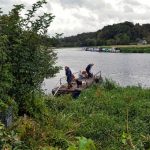[vc_row][vc_column][vc_column_text]On October 7th, 2017, a large community clean-up was held…
Celebrating community success in Ashbourne
Community Water Officer Aoife McGrath tells us how a community action group is helping tackle litter and pollution in and around the River Broadmeadow in County Meath.
The Ashbourne community are helping to restore the River Broadmeadow to its former glory. In 2017, the community formed the Broadmeadow River Action Group to help tackle litter pollution and diffuse urban pollution on the River. During its first year, the voluntary group achieved some commendable results. This included organising multiple river-clean up days; being awarded a €7,000 grant under the Anti-Dumping Initiative; and hosting a memorable Family Fun Day to mark Water Heritage Day.
Working with the Waters and Communities Office, the community are steadfast in their goals for 2018. Major plans are afoot to continue the regular clean-up days; as well as organising more family fun days; and working with Inland Fisheries Ireland to roll out its “SomethingFishy” Education programme to the local schools. 2017 has been a year of remarkable success for the newly formed Broadmeadow River Action Group – congratulations to all the local volunteers involved.
Aoife McGrath, Community Water Officer, Local Authority Waters and Communities Office







